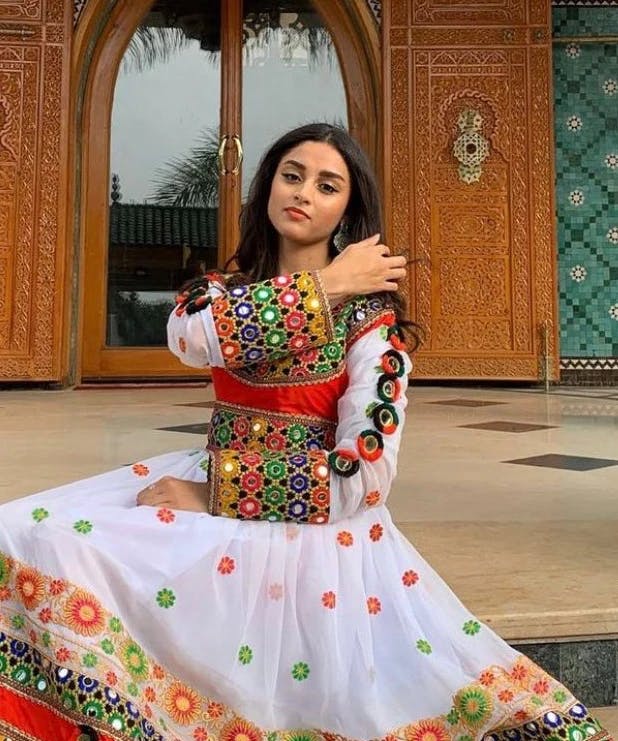Afghan Women Are Wearing Traditional Dress To Protest The Taliban’s Harsh Dress Codes
Since the Taliban took control of Afghanistan last month, the country has experienced many changes. In just a few weeks, strict rules and punishments have been implemented which raise human rights concerns.

Women are especially vulnerable to extreme cruelty under Taliban rule. Those who do not comply are beaten or killed, but one movement has found a way to stay strong without taking to the streets, and it involves the power of fashion.
Why What Women Wear Matters
How a woman dresses isn’t just a reflection of herself, but also of her culture and values. You can tell a lot about a woman’s politics and beliefs just based on what she wears in free-world countries like the U.S.
Clothing that suits our shape and size accentuates our femininity. The colors we choose to wear hold the power to uplift and inspire because there are so many beautiful shades in our world.
So when women are forced to wear a burqa, they’re not only being robbed of their self-expression but also of an outward love of their faith, culture, and fellow man. It’s completely different than choosing to wear a burqa. If a woman chooses it, that is her right no matter where she comes from or how she lives, but when facing violence and even death for simply wearing a colorful dress, womanhood is caged and stunted, and their passion grows cold.
The Courage of Culture
Dr. Bahar Jalali is an Afghan historian who started the Twitter movement #DoNotTouchMyClothes. She recently opened up about fears that her country is experiencing a “cultural genocide,” and wanted to do something about it. She shared pictures of herself in traditional Afghan clothing – colorful and intricately decorated dresses – with the hashtag #DoNotTouchMyClothes.
Dr. Jalali also retweeted a tweet by Peymana Assad, in which Peymana commented, “Our cultural attire is not the dementor outfits the Taliban have women wearing.”
The Harry Potter reference immediately gained attention because so many in the West just assume that a dark burqa is what women wore before the American presence in Afghanistan. To destroy this absurd misconception, Dr. Jalali and many other women have posted selfies wearing their true cultural garb, and the dresses are stunning.
One user tweeted, “this is what an afghan woman looks like. this is our culture. this is our traditional dress. we love lots of colour. ever our rice is colorful and so is our flag.”
Tahmina Aziz tweeted, “I wear my traditional Afghan dress proudly. It’s colorful and beautiful. Not at all like the images you saw circulating yesterday.”
Many more women have shared pictures of their traditional Afghan dresses as part of the online movement and protest against the suppression of their native culture.
The Taliban Didn’t Even Come from Afghanistan
The Taliban has led Westerners to believe that their draconian policies are their culture. They have relied on the ignorance of other nations to continuously destroy the rights of women, which destroys their own narrative that they’re the rightful leaders of Afghanistan.
Dr. Jalali’s Twitter campaign was sparked by a pro-Taliban protest that supposedly took place last weekend. Images produced from the event display Afghan women covered in black from head to toe, even wearing gloves to cover their hands.
She was skeptical of the event and believes it may have been staged. She also noted that the Taliban didn’t originate in Afghanistan but emerged in Pakistan, so, “They’re not culturally Afghan.”
Closing Thoughts
The Taliban obviously knows nothing about the Afghan culture, spirit, and fashion. If they did, maybe they wouldn’t have to beat women, execute dissidents, and terrorize schoolchildren to gain “support.”
The #DoNotTouchMyClothes campaign isn’t just about fashion. It’s about the right to honor one’s sense of purpose and heritage. It’s about Afghan women showing the world who they truly are, and that no one ‒ especially the Taliban ‒ can stop them.
Help make Evie even better! Take the official Evie reader survey.